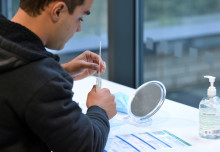

A low energy cold-storage solution that preserves harvested crops in hot climates has won the Business School’s student innovation prize.
The winner of the 2024 Ideas to Impact Challenge is Zaraat, a startup designed to help small-scale farmers in India preserve fruit and vegetables after the harvest (which takes place from October to March), by giving them the opportunity to rent temperature-controlled storage for their produce. The project utilises low-energy evaporative cooling technology to keep the crops fresh, creating an affordable way to minimise food waste.
Food waste and other damage after crops have been harvested is normally caused by a lack of proper storage and transportation facilities. This is one of the major challenges faced by farmers in India, where agriculture makes a significant contribution to the country’s economy, but machinery and energy infrastructure are often inadequate in poorer regions.
The winning team comprised two students from Imperial College Business School, Sankar Venkataraman Murali (MSc Innovation, Entrepreneurship and Management) and Sanyam Jain (MSc Business Analytics). Both students are Indian nationals.
Winning first place in the final of the competition, Mr Murali and Mr Jain have been awarded £7,000 in seed funding to further develop their project. They will also receive continuous mentoring and business support from experts at Imperial to further develop their business.
A statement by Mr Murali and Mr Jain following their win said: “Winning this competition is a testament to the potential power that Zaraat holds in revolutionising the agricultural sphere in India. The prize money will help us fulfil our vision of making affordable storage solutions within reach for small and low-income farmers.”
“When thinking about the future of humanity and the kinds of challenges we’re facing, we need creative solutions like these to change the lives of people on the ground.” Professor Sankalp Chaturvedi Co-Director of the Gandhi Centre
The Ideas for Impact Challenge was founded by the Gandhi Centre for Inclusive Innovation at Imperial College Business School. The annual competition, now in its ninth year, brings together student entrepreneurs from across the world to compete for funding for their innovative business ideas that aim to solve real world challenges. The Gandhi Centre was established in 2007 to help organisations worldwide create tangible social impact, with the Ideas to Impact challenge designed as part of this mission.
The second placed team, Mongo App, received £5,000 for their business venture, the first AI-powered financial coach. Developed by Alisha Chowdhury and Henrique Noblat from the London Business School and Luciano Gucciardo, an engineer at Tymit, the App aims to provide personalised coaching to help university students improve their financial literacy. The students plan to expand the project to include postgraduates and secondary school students.
The teams presented their ideas to a panel of industry experts, who considered criteria including sustainability, scalability and innovation to decide the winners.

In keeping with the Gandhi Centre’s commitment to social innovation, the finalists heard from social innovator and futurist Myriam Taylor. In her keynote speech, Ms Taylor encouraged the finalists to become catalysts for change. In her words, she said: “strive to align your efforts with the overarching goals of justice, equity and sustainability. Dream beyond the conventional boundaries and dare to envision solutions that can transform millions of lives.”
Reflecting on this year’s final, Professor Sankalp Chaturvedi, Co-Director of the Gandhi Centre, said: “We can see that more and more young people are engaging with our social mission. This was visible not only in the eight finalists we saw but the number of applications we received from this year’s competition from across the world.
“When we’re thinking about the future of humanity and the kinds of challenges we’re facing, we need creative solutions like these to change the lives of people on the ground.”
Article text (excluding photos or graphics) © Imperial College London.
Photos and graphics subject to third party copyright used with permission or © Imperial College London.
Reporter
Helena Kudiabor
Centre for Languages, Culture and Communication



